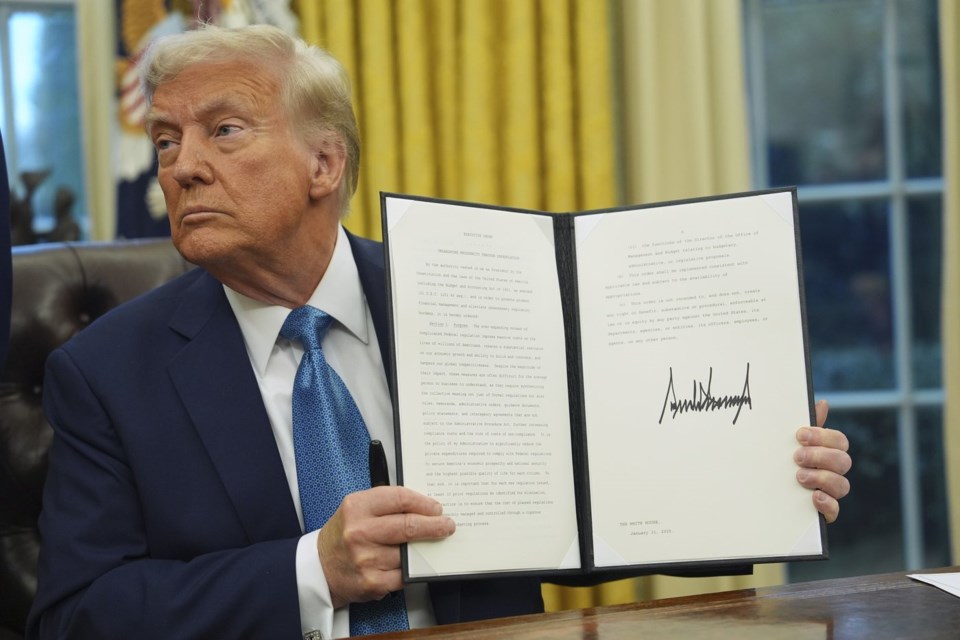WASHINGTON — U.S. President Donald Trump said Friday he is considering a lower tariff on Canadian oil as the White House confirmed he is going forward with 25 per cent levies on imports from Canada on Saturday.
As he signed executive actions in the Oval Office on Friday, Trump was asked directly if he intends to hit Canadian crude with tariffs.
"I'm probably going to reduce the tariff a little bit on that," Trump said. "I think we're going to bring it down to 10 per cent on the oil."
While answering a different question, Trump also floated the idea of oil tariffs coming on Feb. 18. It was not clear if that statement was in relation to Canada.
The prospect of a lower levy on oil likely offers little relief to Canadian officials in Washington, D.C., making a final diplomatic push to convince Republican lawmakers and Trump's team to sway the president.
The president said there is nothing that Canada, Mexico or China can do to prevent the tariffs from being implemented.
"We have big deficits and it's something we are doing. We'll, we'll possibly very substantially increase it or not, we'll see how it is," Trump said.
While the president wasn't clear on the details of his tariff plan, he repeated his complaints about trade deficits and again linked the duties to fentanyl entering the United States.
Earlier Friday, Prime Minister Justin Trudeau said Canada is ready to deliver a "purposeful, forceful but reasonable immediate" response to the tariffs. The federal government has said it has multiple options for retaliatory tariffs ready to deploy, depending on what Trump ultimately does.
The Prime Minister's Office said he did not personally discuss the tariffs with Trump on Friday.
Trudeau met with a Canada-U.S. cabinet committee Friday as Foreign Affairs Minister Mélanie Joly, Public Safety Minister David McGuinty and Immigration Minister Marc Miller met with Republican officials in Washington, D.C., including Trump's border czar Tom Homan, in a last-ditch attempt to avert the tariffs.
"We continue to believe that we have a very strong case when it comes to, first, our border, and second, also to our trade relations," Joly said.
Despite the extensive outreach on the eve of the tariff deadline, the ministers said they don't know what might happen. If the tariffs are imposed, Canada will have a "strong retaliation plan," Joly said.
White House Press Secretary Karoline Leavitt on Friday denied Trump's tariffs would cause a trade war.
It will be up to the president to decide when or how to roll the tariffs back, Leavitt said.
Trump claimed tariffs don't cause inflation. He acknowledged Friday that "there could be some temporary short-term disruption" but said "people will understand that."
Trump initially claimed his 25 per cent tariff threat was in response to what he called the failure by Canada and Mexico to curb the illegal flow of people and drugs across the border.
His complaints have since expanded far beyond border security.
The volume of drugs entering the United States from Canada is minuscule compared to the amounts coming from Mexico and China.
U.S. Customs and Border Protection figures show that officials seized 9,930 kilograms of fentanyl at American borders between October 2023 and September 2024. Only 20 kilograms of that amount came from Canada.
Canada responded to Trump's concerns with a $1.3 billion border security plan.
Some officials and experts have suggested the damaging duties are part of Trump’s strategy to rattle Canada and Mexico ahead of a mandatory 2026 review of the trilateral trade pact. Trump has denied the recent threat of tariffs was part of a plan to expedite negotiations.
Miller said he does not believe the duties are actually about border concerns, migration and fentanyl. The minister said "we need to convince the Americans that it isn't."
He said part of that effort involves presenting key Republicans with facts about the border in the hope it will sway Trump.
"We went into these meetings with no guarantees and we certainly can't guarantee that to Canadians tonight," Miller said in Washington Friday. "But I think Canadians would want us to make that effort."
U.S. Secretary of State Marco Rubio said Thursday the tariffs are "not hostile moves," adding he doesn’t think Canada poses a strategic threat to the United States. Pointing to his meeting with Joly earlier this week, Rubio said Canada and the U.S. have shared interests along the border.
"They’re good friends. I mean, we work with them on a lot of things," Rubio said on The Megyn Kelly Show. "We have a deep partnership with them … but there are some issues we’re going to need to address."
Speaking before the meeting of the Council on Canada-U.S. Relations in Toronto on Friday, Trudeau said Canada "could be facing difficult times in the coming days and weeks."
"I won't sugar-coat it," he said.
Premiers have disagreed on how Canada should respond if Trump follows through on his threats. Alberta Premier Danielle Smith and Saskatchewan Premier Scott Moe have said exports of oil and other resources should not be included in retaliation plans.
Smith's office said Friday that the premier is waiting, along with everyone else, to see the details.
"The premier has been clear from the start that any tariffs imposed by the U.S. on Canadian goods will hurt American and Canadian consumers, workers and businesses," the statement said.
Ontario Progressive Conservative Leader Doug Ford called for a dollar-to-dollar tariff response during a campaign stop in Niagara Falls, Ont.
Ultimately, Ford said, provincial and territorial leaders remain united.
"We have to show strength, being united, and emphasize to the federal government that we have to retaliate hard. Not soft, hard," Ford said.
— With files from The Associated Press
This report by The Canadian Press was first published Jan. 31, 2025.
Kelly Geraldine Malone, The Canadian Press


